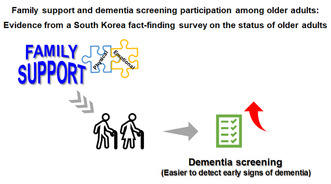Family support and dementia screening participation among older adults: Evidence from a South Korea fact-finding survey on the status of older adults
Abstract
Objectives
South Korea is one of the most rapidly aging societies worldwide and the prevalence of dementia is expected to rise to 10.3% by 2025. Early diagnosis requires early access to support, information, and medication. Dementia screening is important for the success of dementia-related healthcare programs. We investigated the rate of participation in dementia screening and the relationship with family support.
Methods
We used data from the 2020 “South Korea fact-finding survey on status of older adults,” a cross-sectional survey targeting adults aged ≥65 years. A total of 9558 respondents were analyzed. We used multivariable logistic regression to analyze the associations between sociodemographic characteristics, including family support, and dementia screening participation.
Results
A total of 62.2% participants received emotional support from their family, and 20.6% received physical support with cleaning, meal preparation, and laundry, general care, nursing, and traveling to the hospital. Of the respondents, 41.8% had participated in dementia screening during the previous 2 years. Older adults with emotional support (OR = 1.41, 95% CI, 1.28–1.54) and physical support (OR = 1.46, 95% CI, 1.31–1.62) were more likely to undergo dementia screening than those without such support. Age, annual household income, education, reason for working, drinking status, exercise, emotional support, and physical support were significantly associated with dementia screening in older adults.
Conclusions
Older adults with low emotional or physical support from family should be considered a vulnerable population with respect to non-participation in dementia screening. Therefore, policies targeting these high-risk groups are needed to increase the dementia screening rate.


 求助内容:
求助内容: 应助结果提醒方式:
应助结果提醒方式:


